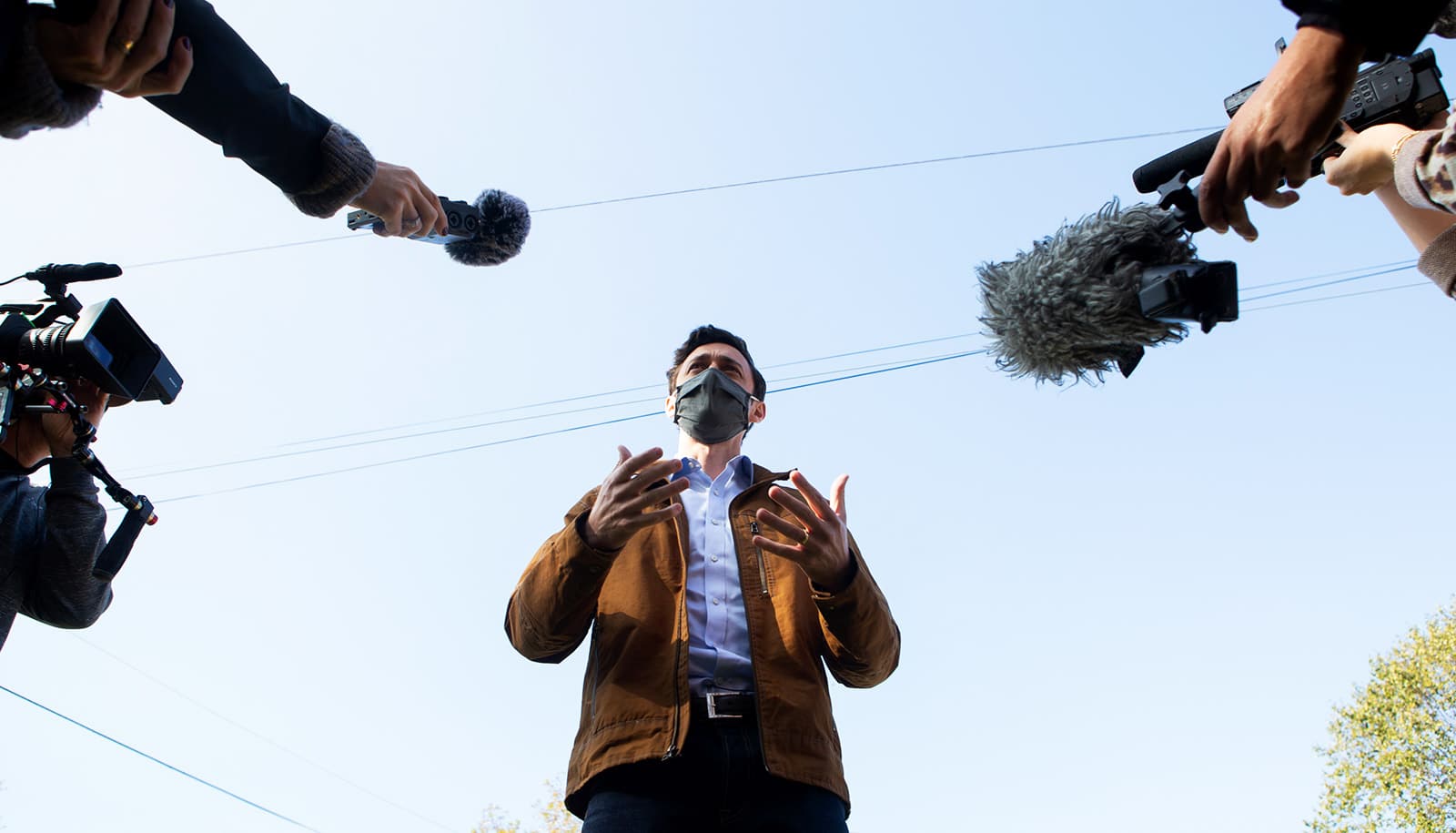
Democratic US Senate candidate Jon Ossoff holds a press conference outside the Metropolitan Library polling location on November 3, 2020 in Atlanta, Georgia. (Credit: Jessica McGowan/Getty Images )
‘Horse-race’ coverage may hinder Senate candidates
News coverage focused on strategy over policy can hinder the success of candidates in US Senate races, research finds.
Media coverage focused on strategy over issues can harm the electoral success of Senate candidates, according to research on the news coverage of more than 150 races.
The new study, published in the Journal Political Communication , focuses on how media coverage affected United States Senate campaigns over five election cycles between 2008 and 2016. It comes as the high-stakes runoff election in Georgia tips the balance of power in the US for the next four years.
Researchers looked at print media coverage of Senate candidates and its relationship with candidates’ electoral success, focusing on the type of framing that was prevalent. Using the Lexis-Nexis archive, they looked at coverage in major US newspapers, such as the New York Times and Chicago Tribune as well as smaller, local outlets . The study’s lead author, assistant professor of communication Dror Walter, says the research included several important and timely findings.
“Senate races are extremely important to the balance of power in American politics…”
“News coverage heavier on strategy-oriented framing, that is, focusing on the horse-race and personal characteristics at the expense of actual policy, is related to lower electoral success of the covered politician,” Walter says. “We also find that the prevalence of this type of coverage is influenced by the competitiveness of the race, candidates’ past experience, and—for Democratic candidates only—the conservativeness of the state in which they run.”
Walter says one explanation for the findings is that horse-race style coverage or strategy-framing was found in prior studies to induce cynicism and alienation among voters, which could, in turn, reduce their intentions to vote for the candidate.
The study authors also say that while news organizations often try to provide similar coverage of all candidates, the volume and sentiment of coverage can differ greatly between candidates in the same race.
“While there were cases where both candidates were covered with a more strategic frame, there were many more races in which candidates were covered to a very different extent from the strategic point of view,” Walter says. “The benefit of our method is that we assign an estimation of strategy and issue-oriented coverage for each candidate. So, both candidates can have a majority of strategy-oriented coverage, but to a different extent.”
Working with Yotam Ophir at the University at Buffalo, the research team used machine learning and network analysis to examine the coverage of 312 US Senate candidates in 156 races.
“We were able to show how novel computational methods allow researchers to empirically examine important social questions that were not long ago perceived impossible to study,” Ophir says.
Using their computational method, the researchers were able to automatically code the news coverage and study a large number of cases.
“Senate elections, especially in some states, tend to gather a lot of news coverage, and analyzing such a large number of articles manually is very challenging,” Walter says. “In our case, we wanted to look at 156 Senate races and almost 200,000 articles. Our methodology for computational text analysis enabled us to analyze this very large corpus in a quick and efficient way and address a question that was not examined by past researchers on a large scale.”
The researchers say their methods and findings could lead to more research into how different types of media coverage and framing of political races can affect which side wins or loses.
“Senate races are extremely important to the balance of power in American politics, as is evident by these crucial runoff elections in Georgia,” Walter says. “The advantage of Senate races vs. presidential ones is the sheer number of cases, allowing us to draw actual empirical conclusions regarding the factors that shape them.”
Source: Georgia State University
The post ‘Horse-race’ coverage may hinder Senate candidates appeared first on Futurity .
Share this article:
This article uses material from the Futurity article, and is licenced under a CC BY-SA 4.0 International License. Images, videos and audio are available under their respective licenses.
Related Articles:
Just feeling exposed to ‘fake news’ makes voters cynical
Oct. 29, 2020 • futurityMask vs. muzzle: Even words are now polarized
Oct. 23, 2020 • futurityLinks/images:
- https://doi.org/10.1080/10584609.2020.1858379
- https://www.futurity.org/role-of-journalists-truth-2390862-2/
- https://www.futurity.org/local-news-deserts-newspapers-podcast-2297952/
- https://news.gsu.edu/2021/01/07/researchers-find-horserace-style-coverage-harms-senate-candidates-electoral-success-on-either-side/
- https://www.futurity.org/horse-race-coverage-senate-candidates-2499962/
- https://www.futurity.org


